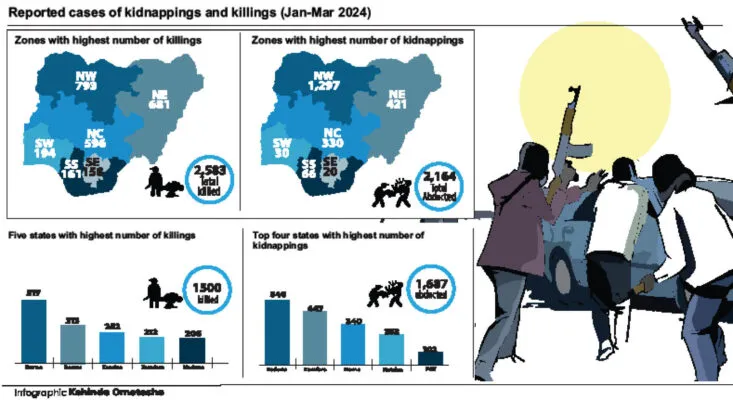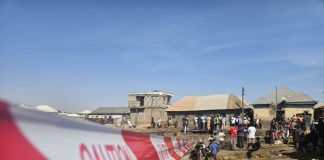According to data from Abuja-based security risk management and intelligence firm Beacon Security and Intelligence Limited, at least 2,583 persons were killed and 2,164 kidnapped in the first quarter of this year.
According to the data, which tracked the number of homicides and kidnappings nationwide between January and March, the North accounted for 81% of homicides and 94% of abductions.
However, this information contradicts the assertion made by Nuhu Ribadu, the National Security Advisor (NSA), that the number of casualties is declining.
According to a research by a consulting firm, every day an average of 28 people were killed and 24 kidnapped.
Earlier this month, at the inaugural annual lecture series hosted by the Nigerian Army Resource Centre in Abuja, the Minister of Defence, Muhammad Badaru Abubakar, stated that the security situation had improved.
Numbers of casualties in states and zones
793 persons from the North-West, 681 from the North-East, and 596 from the North-Central regions were among the victims killed during that time, according to data from Beacon Security and Intelligence Limited.
The deaths were reported from battles between communities, attacks by bandits, and disputes between farmers and herders.
194 homicides were reported in the South-West, 161 in the South-South, and 158 in the South-East. Borno had the largest number of killings (517); followed by Benue (313); Katsina (252); Zamfara (212); and Kaduna (206).
Abductions
The data showed that of the 2,164 persons abducted within the period, 1,297 were kidnapped in the North-West, 421 in the North-East, 330 in the North-Central, 30 in the South-West, 66 in the South-South and 20 in the South-East.
Kaduna State recorded the highest number of abductees with 546; Zamfara, 447; Borno, 340; Katsina, 252 and the Federal Capital Territory (FCT), 102.
Experts hopeful Tinubu will tackle challenges
Security analysts, who spoke to Daily Trust, said the numbers of killings and abductions that happened in the first quarter of this year reflected a broader pattern of escalating violence and insecurity that had enveloped the North in particular, disrupting lives and instilling fears in the populace.
One of them, Ahmed Getso, observed that the intensification of coordinated security operations by security agencies had compelled criminals to migrate, seeking new territories to evade the law enforcement focus.
“When security forces concentrate their efforts on high-risk areas, criminals tend to relocate to different communities,” Getso said.
He said the present administration was receptive of criticisms regarding security challenges. He said this was contrary to the security approach of former President Muhammadu Buhari’s administration, which he described as largely dismissive of calls for reforms, criticisms and commentaries from experts, professionals and academics.
The CEO of Beacon consulting firm, Kabiru Adamu, in an interview with Daily Trust, attributed the security challenge in the North to ineffective justice system, poor land administration policies, presence of non-state armed groups, ungoverned spaces, porous borders as well as proliferation of small arms and light weapons.
He said the large youth population lacking education and skillsets, as well as a governance system failing to meet the developmental needs of the people poses serious challenges.
Adamu said the nation’s security challenges could best be improved through collaboration among security sector organisations, federal and state governments as well as neighbouring countries.
We’ve reduced casualty figures – Ribadu
The NSA, had in a pre-Convocation lecture he delivered at the Usmanu DanFodiyo University, Sokoto, on Thursday, said the present administration had made serious progress in reducing casualty figures from terrorists’ attacks.
He said, “Since the coming of this administration, we have not seen any organised terrorist attack. Roads hitherto unsafe for commuters, for instance the Abuja- Kaduna, Zaria-Kano are today secure for travellers at any time of the day.
“We are not out of the woods yet, but we have made serious progress in pushing down casualty figures and depriving miscreants access to weapons and free movement. Since assuming office, we have also successfully freed over a thousand individuals, many of whom were villagers held captive for as long as two to three years. We successfully secured the release of abducted students from the Federal University of Gusau and school children from Kuriga without paying ransom.
“Our non-kinetic strategies and approach are driven by evidence. We have strengthened the administration of criminal justice by reopening trials of Boko Haram terrorism suspects detained in Kanji and other locations across the country and prosecutions are now underway in eight different courts. “Concurrently, we have significantly reduced the proliferation of arms nationwide by blocking the flows and arresting gunrunners”, he said.
Ribadu said estimates suggested there are over 300 bandit warlords, each commanding at least 50 fighters operational across different regions of Northern Nigeria.
“Like in the pre-colonial era, kinship and community ties continue to play significant roles in banditry, with bandit groups often operating within defined ethnic or kinship lines, forming bandit families or clans.
“These groups rely on extensive networks of informants, safe houses, and community support to evade authorities or rival factions. The loyalty within these families and the code of silence among community members have made it challenging for authorities to effectively combat banditry,” the NSA stated.







